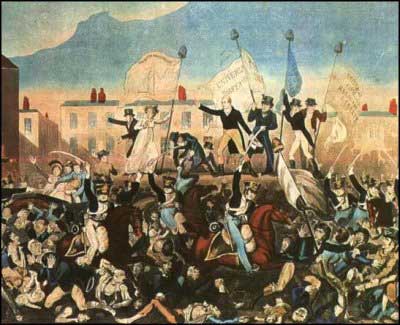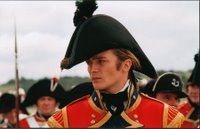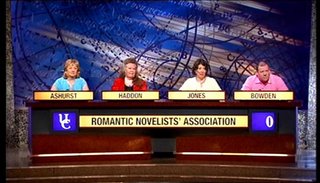 Reminiscences of Captain Gronow, Formerly Of The Grenadier Guards And Member Of Parliament For Stafford, Being Anecdotes Of The Camp, The Court, And The Clubs, At The Close Of The Last War With France, Related By Himself, together with its three, thankfully more succinctly titled, sequels is one of the most valuable sources of information on the Regency haut ton, but it has not always been that easy to get hold of. Indeed the most recent edition listed on Amazon, from 2004, has a sales ranking of "none", which is quite an achievement.
Reminiscences of Captain Gronow, Formerly Of The Grenadier Guards And Member Of Parliament For Stafford, Being Anecdotes Of The Camp, The Court, And The Clubs, At The Close Of The Last War With France, Related By Himself, together with its three, thankfully more succinctly titled, sequels is one of the most valuable sources of information on the Regency haut ton, but it has not always been that easy to get hold of. Indeed the most recent edition listed on Amazon, from 2004, has a sales ranking of "none", which is quite an achievement.Now Ravenhall Books have come to the rescue, with a well-designed and well-produced edition from Christopher Summerville, a historian and writer specialising in the early nineteenth century, and author of Napoleon's Polish Gamble.
Summerville states in his preface:
My purpose in presenting this volume of Gronow's celebrated memoirs is to serve up a palatable slice of Regency history for the general reader. To this end, I have strived to prepare a book that is light, pleasing, easily digested, and moreish.The result is a selection from Gronow's work, concentrating on the Regency period (Gronow's Reminiscences cover his life all the way through to 1865), and arranged in broadly chronological order. This produces a book of four parts, covering the Peninsular War, Waterloo, Restoration Paris, and Regency London.
Editorial additions include a biographical sketch of the Captain, and short essays providing the historical context for each section. There is a sprinkling of explanatory footnotes, explaining people and things mention in the text. Summerville admits to having modernised Gronow's punctuation, and has apparently "restructured" one or two of his anecdotes. He has also unsuppressed a few names, where these are known. There are 16 pages of black and white plates in the midle of the book, mostly portraits and cartoons illustrating people mentioned in Gronow's accounts.
The one thing that the book lacks is an index. It is a pity that it is not possible to look up "Almack's" or "Manton's" and go straight to some half-remebered anecdote involving one or the other.
Despite the omission this is a very nice volume, and I must credit Mrs Wenlock for finding it and giving it to me as a birthday present.
 So much for the book. What about the Captain himself? I have to say that I don't warm to the man. He is never slow to put down others and boast about himself. For example, the anecdote about Manton's Shooting Gallery is one of several designed to denigrate Byron (he secretly used curlers on his hair, he frequently went boating with a lad who was possibly a girl in disguise). Having mocked Byron's high opinion of his (Byron's) shooting, Gronow adds
So much for the book. What about the Captain himself? I have to say that I don't warm to the man. He is never slow to put down others and boast about himself. For example, the anecdote about Manton's Shooting Gallery is one of several designed to denigrate Byron (he secretly used curlers on his hair, he frequently went boating with a lad who was possibly a girl in disguise). Having mocked Byron's high opinion of his (Byron's) shooting, Gronow addsLords Byron, Yarmouth, Pollington, Mountjoy, Wallscourt, Blandford, Captain Burges, Jack Bouverie, and myself were in 1814 - and for several years afterwards - amongst the chief and most frequenters of this well-known shooting-gallery and frequently shot at the wafer for considerable sums of money. Manton was allowed to enter the betting list and he generally backed me.But the most egregious example of Gronow's unpleasantness appears in his account of the Spa Fields Riots. In November 1816, the Reform movement organised a rally in Spa Fields, in Clerkenwell, with the aim of petitioning the Prince Regent to reform Parliament. Gronow had been sent with a company of Guards to occupy the nearby prison and "to act, if necessary, in aid and support of the civil power." The crowd of 10,000 (described by Gronow as a mob of 60-70,000) was eventually ordered to disperse, before they could be addressed by one of the great advocates of electoral reform, Henry "Orator" Hunt. Gronow calls Hunt "notorious" and "the blacking-maker", and describes him as "a large, powerfully made fellow, who might have been taken for a butcher." There was no actual riot on this occasion, in contrast to what happened at a similar event in St Peter's Fields, Manchester, three years later.
Gronow concludes his account with an epilogue.
Several years after this event, at the time of the Reform Bill, Hunt was elected Member of Parliament for Preston... and I was elected for the immaculate borough of Stafford. I well recollect - but cannot describe - the amazement of the blacking-man when I told him one evening, in the smoking room of the House of Commons, that if any attack had been made upon the prison at Spa Fields, I had given my men orders to pick off Major Cartwright, himself, and one or two more who were in the cart. Hunt was perfectly astonished. He became very red and his eyes seemed to flash fire: 'What, sir! do you mean to say you would have been capable of such an act of barbarity?' 'Yes,' said I, 'and I almost regret you did not give us the opportunity, for your aim that day was to create a revolution and you would have richly deserved the fate which you so narrowly escaped by the cowardice or lukewarmness of your followers.'Hunt had been at Peterloo (he is the figure in the centre of the stage, holding a white hat, in the picture below). He is unlikely to have been impressed by Gronow's posturing.

Regency Recollections, Captain Gronow's Guide to Life in London and Paris edited by Christopher Summerville, Ravenhall Books, 2006. £16-99
Technorati Tags: book+review, regency






